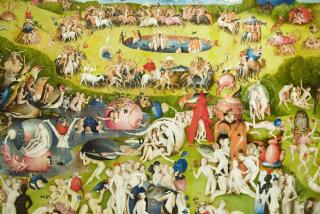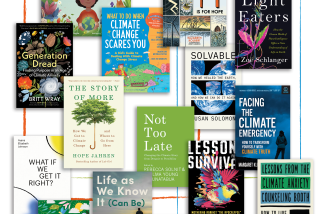Looks like we’ve bitten the hand that feeds us
Worried about overpopulation, pollution, dwindling natural resources and global warming? Well, the good news, according to British paleobiologist Michael Boulter, is that our selfish behavior as a species may not, in the long run, destroy our beautiful planet or most of the life forms that inhabit it. The bad news, however, is that our abuse probably will put an end to most of the larger mammals, in particular us, the soi-disant Homo sapiens, apparently less sapient than billed.
A professor of paleobiology at the University of East London, Boulter has been studying extinction, including the five major mass extinction events that have occurred since the beginning of life on Earth. The largest single factor in each case, he concludes, was radical change in the environment, leaving erstwhile flourishing species suddenly unable to survive. “Evolution,” Boulter explains, “is less to do with winning battles between species and individuals, more to do with being able to live well together in the same environment.”
Right now, he believes, we are on the verge of another mass-extinction event. Scientists in almost every field have been finding evidence that our climate, water levels and atmosphere are changing at an alarming rate. In the past, such drastic environmental changes were caused by impersonal forces like asteroids, meteorites or intense volcanic activity. This time, however, the culprit has been man. Our agriculture has been destroying forests and other natural habits. Migration and travel on an unprecedented scale have spread disease and wiped out native species of plants and animals. And our increasing consumption of fossil fuels is causing radical changes in climate.
These, in turn, he predicts, will unleash floods, droughts, disease, famine and wars, along with other unimaginable horrors resulting in the end of the human species. Freed of this disruptive element, other species will eventually bounce back and flourish nicely.
Boulter bases his dire prediction on several key factors: data about the rapidly deteriorating state of our oceans, forests, climate, soil and atmosphere; the pattern he discerns in mass-extinction events of the past; and a version of the so-called Gaia theory, which maintains that life on Earth is a complicated, self-regulating system that will eventually return things to a more peaceful state by first getting rid of the chief troublemaker, the humans.
Mother Earth as an angry parent punishing her most destructive child? As Boulter explains, it is not necessary to descend to anthropomorphic fables to grasp the thesis. A complex animal like man, whose population has shot up exponentially over the last century and who (unlike an amoeba, jellyfish or rat) requires so much to sustain life, is more likely to suffer from the consequences of the floods, droughts, famines and diseases that will be unleashed when, for instance, the Himalayan snowpack melts down onto the Indian subcontinent or the cities of New York, Baltimore, Boston and New Orleans are submerged by the ocean.
Can anything be done? Boulter is extremely skeptical: “There are conventions and summits, a permanent United Nations Conference to look after the Biodiversity Convention, as well as regular meetings of environment ministers. But sales of cars and refrigerators soar in China and India; gasoline stays cheap in North America; Europe consumes timber from a dwindling tropical rainforest. The tourist industry booms globally.” It is his belief that our species lacks the political will to modify our behavior: We are simply too selfish and aggressive for our own good.
Boulter writes with clarity and verve about findings, theses and models from a wide variety of fields. Still, it can sometimes be hard for the nonscientist to follow some of the more technical arguments or to get an overall sense of how all the parts fit together. And indeed, the sheer complexity of the subject, as Boulter remarks, is one reason why political leaders and the general public have so poor a grasp on the severity and magnitude of the problem. But simply because scientists have not yet arrived at incontrovertible proof does not mean that we can ignore the alarming picture that is developing.
Unlike some scientists, who have raised urgent voices in desperate warning, hoping to persuade political leaders to act before it’s too late, Boulter’s tone is oddly serene, almost blithe: “The effect [of humans’ becoming extinct] would be that the abuse would stop being inflicted and peace and quiet would return.” His curious air of sang-froid would seem to bear out Nietzsche’s complaint about scientists being so coolly objective as to seem lacking in ordinary human feeling. Is he writing this book simply to give himself the satisfaction of having been right? Isn’t there some danger that his defeatist tone may convince readers that the environmental cause and mankind are doomed anyway, so why not gas up the SUV and drive at 80 mph?
Boulter’s pessimism is understandable. Over the course of our history and prehistory, humans have killed one another and hunted many species to the point of extinction. Since the Industrial Revolution, we have been wreaking havoc on the natural environment. Boulter sees selfishness and aggression as our fatal flaws. But, considering the shortsighted way many of us behave, selfishness -- or the ability to grasp what is in our own interest and act on it -- would be a step up.
We’ve all seen “selfish” drivers running red lights, cutting ahead of other cars or swerving at breakneck speed across several lanes of traffic. Yet, “selfish” drivers gain no real “advantage”: They risk becoming involved in accidents, damaging their cars and possibly injuring or even killing themselves. Surely, truly “selfish” drivers who value their time, money and lives would be cautious, alert and courteous. What makes us so oblivious to our own well-being? Perhaps, as Boulter suggests, aggression is to blame for making us not just selfish, but downright stupid. Perhaps this book, like a splash of cold water, will help wake us up.
*
Extinction
Evolution and the End of Man
Michael Boulter
Columbia University Press: 224 pages, $26





